British director Ken Russell went through a period during the Seventies when he directed a series of films based on his interpretation of what motivated great artists: Tchaikovsky, Gaudier-Brzeskam, Mahler, and Liszt. The latter interpretation, 1975’s Lisztomania, was close in style to his previous film, Tommy, with the Who’s lead singer Roger Daltrey again playing the lead role, this time impersonating Franz Liszt. This film is clearly not meant to be a “literal” biography in any sense, although certain personages of Liszt's period do crop up from time to time. Liszt was certainly a colorful character, and the fact that he was a friend of German composer Richard Wagner apparently gave Russell the idea of making a “political statement.”
It should be pointed out that “Lisztomania” was an actual thing, not something Russell made up. Liszt was a piano virtuoso who made the instrument sound like a symphony, according to contemporaries; no one attacked the piano like Liszt before or since. Liszt acquired a fan base that descriptions of it call to mind the reaction that the Beatles encountered during their tours—fans chanting and screaming, rushing the stage, trying to snatch any personal effect (clothing, hair—even a cigar he threw in a sewer). Russell seems to be playing off this and Liszt’s romanticism and religious faith with that of Wagner—portrayed as a half-mad revolutionary whose music was meant to inspire an extreme form of German nationalism, one that would become the “soundtrack” of Nazism. The intent is clearly to make a political statement about good (Liszt) and evil (Wagner), although it should be pointed out that both Liszt and Wagner died before Hitler was even born.
It isn’t clear in watching Lisztomania for the first time that this is where the movie is going, and again, this isn’t anything close to a “straightforward” biography of either musicians, but that isn’t the point. Lisztomania engages in so many stylistic and genre changes that it often borders on the absurd, but if one is patient they can see the “growth” of Liszt from some glitter rock star/Liberace with a crazed fan base that swoons at every note, to a born again Christian composing religious hymns and whose eventual mission is to stop the evil Wagner. In reality, Liszt seems to have grown tired of concert circuit, and under the influence of one of his mistresses, Princess Carolyn Sayn-Wittgenstein, he decided to devote himself to composing, although he never really achieved the kind of lasting fame of other composers of the classical period did.
Lisztomania dispenses with Liszt’s time as a child prodigy and his musical training, and jumps right into the business of being something less than to be taken seriously comic romp, just the first of many tonal changes this film takes that leaves the viewer somewhat baffled about where this film is headed. First we encounter a screwball scene where a French count discovers his wife Marie d’Agoult (Fiona Lewis) in bed with Liszt (Daltrey)…
What sounds like a Country & Western tune describes the action: “Now did you see that mighty blow? Good grief that sword has stuck it low I think Franz Liszt has just been circumcised”…
…while Marie has “Already found a substitute. Well, bananas are quite cheap this time of year"...
…but when the count throws another “substitute,” she points out that his own performance is “dead”:
Eventually the count takes control of the situation…
… but Marie begs the count to spare him: Don’t cut his genius in its prime, to which the count declares he has no intention of spoiling his blade on a commoner, but rather had a more “appropriate” punishment in store for both of them...
...inside a piano as a very small train approaches:
Of course this can’t be the end of the story, can it? Nah, because the credits haven’t even started yet:
Liszt awakens as if from a nightmare he has been having…
…while paparazzi snap his picture…
…and his (female) fans can wait to get through the door after him:
Liszt is accosted by Wagner (Paul Nicholas) dressed in a sailor’s outfit, meant to identify him as quasi-socialist revolutionary in the manner of the Battleship Potemkin mutineers, although as throughout this film there is no effort at historical accuracy in either time or place. Wagner here tries to interest Liszt in performing his latest composition:
Various famous composers are present who ignore Wagner, except for Rossini, who nonetheless seems more interested in scolding him for not eating:
A roadie tries to toss the uncouth Wagner out, but Liszt's assistant Hans puts a wad of money into Wagner’s hand as payment for Liszt playing his composition during his next concert performance:
The girls wait breathlessly for Liszt’s arrival on stage…
… they rise in adulation with his appearance…
…and Liszt acknowledges their enthusiasm…
Wagner is provided a seat and is identified as the composer of the piece that he is about to play:
While Liszt in his gaudy outfit plays the piano in an energetic, crowd-pleasing way, police have to hold back fans from rushing the stage…
...but a few do mange to get close:
Meanwhile, Wagner becomes disturbed by the treatment given his composition, where in parts Liszt pretends to yawn and plays snippets from the “Chopsticks Waltz”:
Which Liszt clearly means to poke good natured fun at:
Causing Wagner to walk out of the auditorium:
After the disturbances are over, Liszt sends out Hans to check out some of the women in the crowd and find out who they are, including one who is a princess:
As the performance ends, "Lisztomania" is in full swing:
However, Liszt has begun to grow weary of this, and we see no more of it. On the other hand he is back with Marie, who complains of Liszt spending so little time at home with her and their children. He insists he can't just sit home composing, he has to go on tour to make money to maintain a home so his children won't have to live out of suitcases:
They temporarily make up and exchange pleasant reminders of why the admire each other...
...but then in comes Liszt's precocious daughter Cosima (Veronica Quilligan), who tells them she and her siblings discovered their old lover letters in the attic and they were very "funny":
Marie is angered by this and the news that the two younger children are on the roof next to the chimney with the letters in hand. When commanded to come down, they drop the letters down the chimney, making a dusty mess. While Marie leaves to punish the children, Liszt finds one letter that reminds him of a more innocent time, which is revealed in a Chaplinesque scene that begins with dream of simple domestic bliss...
...but runs into trouble when Liszt starts drawing blanks...
...and ends with Liszt and his family being forced to leave their happy life...
...which draws a tear from his eye:
At that moment Hans arrives in a coach to take Liszt away to a concert tour in Russia...
...which displeases Marie, but Cosima will keep a doll of her father to keep him close:
When he tells her not to use it as pin cushion, Cosima looks at him in a mischievous way that will come back to haunt him:
Liszt visits the Russian princess Carolyn who he had seen earlier, and her servant (Oliver Reed in a brief cameo appearance) informs he must wait in a chamber until the hourglass in emptied...
...and Liszt finds himself trapped in the room as some gaseous substance is released through some portals that resemble the heads of penises, knocking him unconscious:
When he awakens, Liszt finds the door unlocked and is confronted by the princess Carolyn (Sara Kestelman, who we remember from Zardoz) smoking a cigar and flanked by phallic symbols:
Carolyn informs Liszt she was unimpressed by the crazed mobs who attended his concerts; they were worshiping a "false god":
She forces him to wear a dress to emasculate him...
...while she complains that a princess's clothes holds her in "bondage," and after disappearing behind a curtain, and reappears dressed as a "woman":
Carolyn asks Liszt if he believes in the holy sacrament of "love"; he admit that he considered becoming a priest, but his father talked him out of it, because he belonged to "art" not the church. "Art" is holy, and inspiration comes from Heaven. His desire is to write "really great music" and Carolyn tells him he can, if he does her bidding:
From here the film mostly dispenses with "reality" into surrealism, which it must because time and place have no meaning, and the characters in the film are there simply to serve Russell's grand political "statement." Liszt admits he was devout as a youth, and his confessor had to explain the Sixth (thou shalt not kill) and the Ninth (thou shalt not lie) Commandments. Carolyn will now show him the "69th" Commandment:
I'm not sure what that was supposed to mean. Carolyn laughs demonically...
...and the women from Liszt's past appear to torment him:
Liszt cries for help, and Carolyn passes him a harp, and his song of something about music clearing the soul seems to calm the women:
But then something seems to be "erecting":
Which the women respond to by dancing in a chorus line...
...and we suppose this is what Carolyn calls how to inspire one to write great music:
But before Liszt becomes too "cocky" there is a reckoning with a guillotine before him:
Liszt sold his soul to the devil for his new-found composing talent, and he must now pay the price. As he cries out when his "head" is cut off, Carolyn asks him what's wrong; it was all a "nightmare." it seems, and Liszt still has his soul:
She praises his latest compositions, and mentions they cannot yet marry because her husband will not grant her a divorce because he loves her money:
Carolyn tells Liszt they must leave Russia before they are arrested by the Czar, since Liszt has aroused suspicion after the publication of a salacious book about him written by a vengeful Marie:
They will go to Germany where they will be safe. Liszt agrees to sign a document composed by Carolyn separating his children from Marie, on condition that Hans supervises their musical education. Liszt admits he is now writing a funeral march for his friends who have died fighting in the Hungarian revolution, but why for a lost cause? Carolyn tells him he will be the leader of a "revolution" in music, and the whole world will sing his songs of "brotherhood":
Liszt decides to compose religious music which doesn't bring in much money or adulation:
He hears sounds of fighting outside, and sees Marie and two of their children running away from it...
...and then being killed by the shelling:
After seeing a baby carriage rolling down the street ablaze, Liszt is shocked by the carnage...
Liszt sings that love is destroyed by man's desire for self-destruction, that war is a waste. His land is dead, but music still lives in him, and this inspires him:
Unfortunately, a "friend" shows up to disturbed his inspiration:
It's Wagner, still the revolutionary, who demands that Liszt hide him from the authorities:
Liszt doesn't betray Wagner's presence when they arrive, but Wagner is obviously half-crazed, demanding money from Liszt so that he can write music that will "fire the imagination of the German people and bring to light a man of iron" who create "a nation of steel" which he hopes Liszt will join him in sneaks in some drug into a glass of wine, which knocks out Liszt
The screen darkens, and Wagner is transformed into a vampire:
Wagner feasts his fangs on Liszt's neck, putting him in a state where he composes a musical number that will also "fire" the German imagination:
After Liszt recovers his senses, Carolyn arrives to announce that her husband has agreed on a settlement, they just need a dispensation from the Pope to marry:
Then we see are a war-shattered land...
...and Wagner encounters Hans, Cosima and their child:
Although she points out that Wagner, despite his delusions of grandeur, is a bum always begging for favors from her "old man," she nevertheless seems intrigued by him:
At a church where he is to be married to Carolyn, Liszt plays music more suited to a funeral. He is visited by a mysterious man in a monk's outfit who looks suspiciously like Ringo Starr, who warns him that the Pope has not granted a dispensation for the marriage...
...as Carolyn becomes more impatient with him. The ceremony eventually goes on...
...but later the marriage is annulled because the Pope did not grant a dispensation. Carolyn vows revenge on the Pope, while Liszt mulls over joining a monastic order:
Next we see Liszt "studying" the holy orders, when he is awakened by the sound of police sirens and the entry of the Pope in cowboy boots and looking suspiciously like Ringo Starr. Liszt claims that there is an "explanation" for why he is in bed with a "nun," and begs forgiveness...
..."truth" is stranger than fiction, he admits. His new music copyist claimed to be a man, came to the monastery disquised as a nun, and held him at gunpoint to force him to bed with her:
The Pope praises his religious compositions, and Liszt could have been the "greatest" but for this sacrilege. Has Liszt heard the news? His daughter Cosima has deserted Hans, left the Church and is now married to the "antichrist," Wagner, who has abandoned all in his "evil climb to power" to become the "Prince of Darkness," his music cunning hymns of hate:
In order to redeem himself and his music, Liszt must perform an "exorcism" on his former friend, and bring Wagner back to the faith:
After the Pope leaves, the "nun" actually does threaten to kill Liszt if he leaves her, which he claims will be doing him a "favor":
Liszt searches for Wagner's "castle," but everyone he asks seems fearful and runs away. When he finds it, he encounters Hans, who tell him it isn't safe to enter, he will be in danger from Wagner's music, which is like an evil drug:
At night Liszt climbs onto a balcony, where he observes a satanic rite...
...the disciples seem to be mostly young girls wearing "Übermensch" outfits with the letter "W," apparently in reference to Wagner:
Now appears Wagner as the rock star with a much more dangerous following:
Cosima appears, clearly under thrall of Wagner; here she gives him the Nazi salute:
Wagner declares that "The new messiah's day is at hand, who "will drive the beast from our land. He will restore the Teutonic godhead. The hour of the Aryan Superman is at hand. I am his prophet, you are his prophets" and that Cosima is his handmaiden, and that Wagner's sacred works are entrusted to her, and that through her, you will perform the ritual, and through himself, you will serve the superman, and you will be the master race!:
Later, a shocked Liszt encounters Wagner, this time seemingly "normal" dressed as a 70s Elton John clone. True, the Church hates him, but what's wrong with Germanic music when it is rid of the Jews?:
Who will do this? The Man of Iron? When is he coming? He's here already here. Dr. Frankenstein just needs to do a few adjustments on a Valkyrie:
Look at his new creation! Isn't he superb? So much power, so much majesty, such grace!:
Which the new Superman promptly demonstrates...
...by urinating in the fireplace, which an embarrassed Wagner puts a stop to:
Liszt points out you can't have a true leader without a soul; Wagner hopes that Liszt will help in that regard, but he refuses. Liszt tricks Wagner into drinking holy water, but it has no effect, as he again grows fangs like a vampire:
Liszt rushes to a piano and begins playing music to drive out the Devil:..
...a storm kicks up driving Wagner into the air...
...and once he lands on the floor, Liszt uses the piano as a flamethrower...
...driving Wagner across the floor...
...and some pillars to fall upon Wagner, mortally wounding him:
Cosima rushes in to find her husband dying...
...and takes her revenge by locking her father in a bedchamber...
...and using the doll of Liszt as a voodoo cushion to exact pain on him:
Cosima, presiding over what appears to be Wagner's funeral, now is in spiritual control of the movement...
...but out of the crypt emerges Wagner as a Frankenstein monster with the hair and moustache of Hitler:
From the window in his locked room...
---Liszt watches in horror as his daughter leads an army of young fanatics armed with grenades on a path of destruction and death in a Jewish neighborhood:
Hans rushes forward, shouting to Wagner to stay in Hell where he belongs...
...but he is gunned down. Cosima leads the stormtroopers forward. Why did Russell portray them as mostly young girls? Perhaps as a counterpoint to Liszt's fan base, and to underscore the banality of evil:
On Cosima's orders, they throw their grenades into Jewish shops:
Cosima, knowing her father has seen all of this, deliberately kills him by thrusting a pin in the voodoo doll's heart:
Next we see Liszt in Heaven playing musical instruments with the women in his life...
...although it is not exactly explained why Cosima is there, only suggesting that unlike Wagner she had a "soul" to "save":
Liszt commandeers some organ spaceship...
...which flies down to Earth...
...to put Wagner, having lost the war...
..."out of his misery"...
...for good:
Flying off back to Heaven, Liszt sings a song about having peace at last:
First of all, I must confess that I am not a big fan of Ken Russell’s films, which isn’t a critique but just a matter of choice, so it may be a bit odd to say that it is two of his lesser known films, Lisztomania and Savage Messiah, are films that are worth repeat viewings for myself. Second of all, I don’t exactly “recommend” Lisztomania, unless you are into “art” films of the 1970s, or are curious about the “artistic” pretensions of auteurs. I mean, nobody makes movies like this anymore; frankly, I can’t think of any for many decades now, although you see the occasional snippet, such as Jeff Bridges' dream sequence in The Big Lebowski. Alex Cox kind of tried it in his 1987 film Walker, which apparently hardly anyone understood; although I kind of “go it,” it was a lost opportunity to illuminate the long history of American abuses in Central America.
Russell claimed that he didn’t have sufficient funding to create the special effects he wanted, most notable in the comical animations in the last act of the film. Lisztomania also changes tone repeatedly, seemingly preparing us for a screwball comedy before launching into a rock opera, followed by a Borowczyk-like sex fantasy before finally evolving (if that is the right word) into a “serious” message film about good versus evil, or the triumph of God over the Devil, or whatever. It is unlikely, however, that Liszt with the lifestyle he pursued found Wagner’s music particularly “dangerous,” since they continued to be off-and-on friends and Liszt occasionally played his music.
Whether or not Wagner would have “approved” of Hitler and the Nazis is debatable, although it is certainly true that his descendants were early supporters of Hitler years before he came to power, and the Wagner festivals in Bayreuth were as much the scene of Nazi pageantry as those in Nuremberg. Wagner was also a virulent anti-Semite and even wrote a pamphlet condemning alleged Jewish influence on music. Nevertheless, German author and anti-Nazi Thomas Mann believed that although “there is plenty of 'Hitler' in Wagner" insofar as their personality traits, "The thought of this idiotic scoundrel reveling in sweet, heroic romanticism is endlessly nauseating."
But the fact remains that Wagner’s music was appropriated by the Nazis for nationalistic and anti-Semitic purposes, and his descendants did nothing to disabuse the Nazis of the notion that he would have approved of the way they were using his music. There had to be a musical “alternative” vision, and Liszt was as good a stand-in as any. Liszt’s life was fascinating at any rate, although this film certainly treats his life as more metaphor for a political message than to be taken as literal “truth,” let alone a serious biography. While the film often seems like a confusing mixture of genres and tone, there at least seems to be some “reason” to it, since each change is accompanied by Liszt and Wagner moving in divergent directions that ultimately lead to that final showdown between “good” and “evil.”




























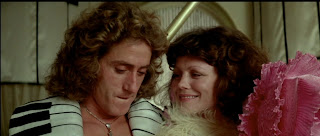






















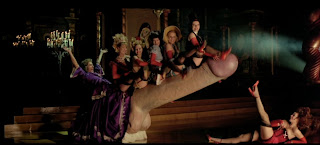
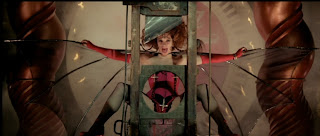





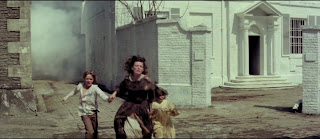

























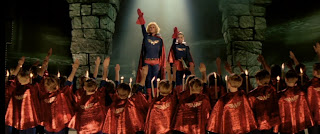








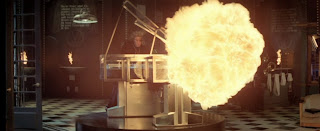















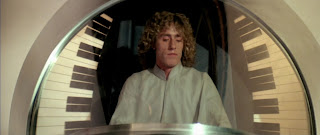





No comments:
Post a Comment